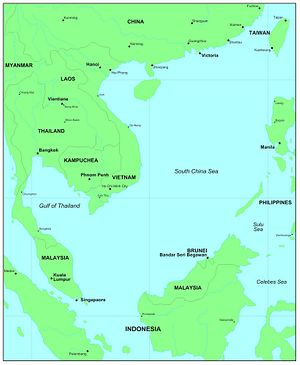As Clint reported earlier today, China has removed its offshore oil rig from waters near the Paracel Islands. The rig, which had been operating in an area Vietnam claimed as part of its exclusive economic zone, caused a major rift between Beijing and Hanoi. The rig is currently being moved to a new project near Hainan, according to China’s Foreign Ministry.
The move came as something of a surprise, as the rig was originally scheduled to stay in the area until mid-August. Speculation raged over why the rig had been removed. A Chinese energy expert told Reuters that he though the rig had simply been able to finish its task ahead of schedule due to favorable weather conditions over the past two months. Other analysts suggest that China took advantage of the upcoming typhoon season to remove a major source of friction between it and Vietnam. Vietnamese Maj. Gen. Le Ma Luong was even more blunt, according to the New York Times. He claims that the “strong reactions” from Vietnam forced Beijing to move the rig early.
The timing of the move is somewhat curious. The rig was set up shortly after Obama’s trip to Asia, causing many analysts to argue that China was sending a signal more to the U.S. than to Vietnam. Now, the removal of the rig comes less than a week after China’s South China Sea maneuvers reportedly “topped the agenda” at the Strategic and Economic Dialogue in Beijing. Still, months’ worth of criticisms (including heated speeches at the Shangri-La Dialogue) have had no effect on Beijing’s calculations; it’s disingenuous to suggest that the S&ED was the tipping point.
More likely, China simply calculated that it had little to gain from keeping the rig in place, especially when compared with the potential benefits of moving it. From a tactical standpoint, the oil rig has largely achieved its purpose. China proved that it has the capability to operate a drill near the Paracels, including the naval force necessary to protect the rig from Vietnamese ships sent to the area. Beijing has also proven itself resistant to external criticisms on the issue, ignoring and counterattacking when Vietnam, the United States, and other regional players accused China of provocation.
After two months, there was little left for China to gain by continued drilling. With the announcement that the drill discovered evidence of oil and gas, it will be easy for China to return the rig to the area at any time. As Hong Lei told the press Wednesday, China National Petroleum Corporation will study the data and “map out a specific work plan in the next step.”
In the meantime, however, China gains the ability to begin trying to repair relations with Vietnam. The task will be difficult after a popular surge of anti-China sentiment in Vietnam, but it would have been impossible with the rig still in place. China is no more likely than it was before to enter into serious talks about the oil rig crisis, as Beijing insists the area is not disputed. However, without the daily irritant of the rig and the accompanying clashes between Vietnamese and Chinese vessels, Hanoi and Beijing can slowly begin to resume cooperation on other topics. Similar logic applies to the U.S.-China relationship, which has been getting positive press in Chinese media since shortly before the S&ED.
The one potential downside for Beijing is the possibility of domestic disapproval. Beijing faced sharp criticism for the decision on Weibo. According to Reuters, many commenters accused China of giving in to U.S. pressure by moving the rig. Accordingly, the Foreign Ministry’s insistence that the move “has nothing to do with any external factor” is likely aimed at a domestic audience as much as a foreign one.
Xi Jinping has tied his administration to achieving the “Chinese Dream” — a major part of which is freeing China from the “bullying” it faced from the West in previous times. Xi is therefore extremely sensitive to accusations of foreign policy weakness and cannot be seen as caving in to Western demands. It will be important for Beijing to prove that it is not giving ground on its territorial claims. Thus, though the oil rig crisis may have ended, we’re likely to see more Chinese action in another part of the South China Sea in the near future offered up as proof of Xi Jinping’s resolve.

































